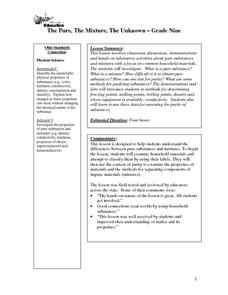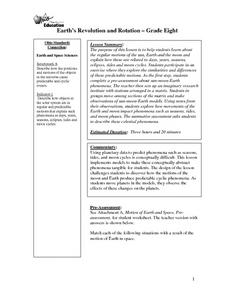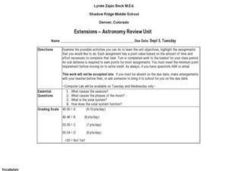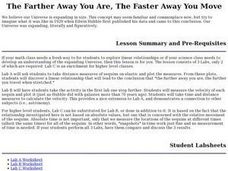Curated OER
50 Common Elements
In this chemistry worksheet, students can read the fifty common elements as a resource for abbreviations and names of them. This is an information sheet.
Curated OER
Introduction to Bonding
In this chemistry worksheet, students create new and true statements while replacing false ones in order to properly define parts of the concept of bonding.
Curated OER
Clouds and the Weather
Fourth graders analyze the relationship of clouds and local weather. Students also observe and record cloud data and weather conditions daily as they research different cloud types. The data is analyzed looking for trends in daily...
Curated OER
The Pure, The Mixture, The Unknown
Ninth graders participate in classroom discussions, demonstrations and hands-on laboratory activities about pure substances and mixtures with a focus on common household materials. They investigate: What is a pure substance? What is a...
Curated OER
Magnets, Electromagnets, and Motors
Learners investigate the concepts of magnetism and its properties. They construct a magnet and test foods for iron content. Then students define the use of a motor and make their own electric motor while working in small groups. Then...
Curated OER
An Egg-cellent Osmosis Experiment
Students investigate the problem of osmosis by conducting an experiment. They use eggs with the shells dissolved to tell whether fluid can move across the membranes. The experiment provides high interest for all kinds of students to keep...
Curated OER
It's in the Bag!
Eighth graders measure temperature changes and make drawings of the interactions between matter and energy. By measuring the temperature students can conclude if there are changes in levels of energy.
.
Curated OER
Move It!
Students explore the notion that simple devices can help us move objects when an understanding of forces is applied. They apply the design process, make predictions, draw sketches, make a model and evaluate their solution.
Curated OER
Balancing Chemical Equations
Ninth graders explain how atoms and molecules form different substances during chemical reactions and how these processes require losing, gaining or sharing electrons. They correctly write chemical formulas and show how a balanced...
Curated OER
Heat Up the Floating Plates
Eighth graders research the connection between the convection currents within the mantle of the earth and the moving of Earth's plates. A connection to lessons at previous grade levels on the rock cycle and important background...
Curated OER
Earth's Revolution and Rotation
Eighth graders investigate the regular motions of the sun, Earth and the moon and explain how these are related to days, years, seasons, eclipses, tides and moon cycles. They participate in an exercise where they explore the...
Curated OER
Extensions - Astronomy Review Unit
Students participate in a review unit in Astronomy using the Layered Curriculum. This allows them to take charge of the type of assessment that is given. The method also allows better differentiation of instruction to occur.
Curated OER
Chemistry - Atoms and Elements
Learners perform varied activities as part of a layered curriculum unit: They write and perform a skit that outlines the evolution of the model of the atom. The script is submitted to the teacher for review before performance.
Curated OER
Machines
Students explain how machines make work easier. They calculate mechanical advantage. Students describe the six types of simple machines and calculate the ideal mechanical advantage for different types of simple machines.
Curated OER
Matter Unit
Students create products from studying about matter that include: Make a "T" chart with matter and non matter items. Write a poem, song, or rap about matter. Five vocabulary words from the chapter must be included in the poem.
Curated OER
Science of Weather
Fifth graders conduct investigations and use appropriate technology to build an understanding of weather and climate. The activity is part of a layered curriculum unit that has the intention of differentiation for students.
Curated OER
Properties of Matter
Second graders investigate how objects can be described, classified and compared by their composition. They recognize that the same material can exist in different states. Students verify that things can be done to materials to change...
Curated OER
Introduction to the Scientific Method
Young scholars designs and conduct a scientific experiment that identifies the problem, distinguishes manipulated, responding and controlled variables, collects, analyzes and communicates data, and makes valid inferences and conclusions.
Curated OER
Charting The Planets
Young scholars conduct different activities in order to unlock the secrets of the universe. They answer different questions that are written to assess knowledge of the planets. Information can be found on the internet to help.
Curated OER
The Farther Away You Are, The Faster Away You Move
Pupils explore linear relationships. The instructional activity uses science to develop an understanding of the expanding Universe. There are 3 Labs, only 2 of which are required. Lab C is an enrichment for higher level classes.
Curated OER
Mighty Minerals-We Use Them Everyday
Third graders investigate the importance of knowing about rocks and minerals. They study the way in which many products are produced from rocks and minerals. Students are shown how we obtain many of the rocks and minerals we use.
Curated OER
Gravity (Newton's Laws of Motion): A Weighty Subject
Students identify Newton's Laws of Motion. They students explore Newton's Laws of Motion and apply the second law with a classroom activity. The videos will provide visual examples of the effects of gravity while riding on a roller coaster.
Curated OER
High and Low: Pressures and Fronts
Students investigate basic information about high- and low-pressure fronts and how they affect the weather. They observe weather patterns and cloud formations. Students study the basic pattern of movement of high- and low-pressure...
Curated OER
Is It There?
Students participate in a lesson designed to illustrate these concepts using simple materials. They use Science process skills to observe, measure, predict, make inferences, and communicate while completing the activity. Proper safety...

























